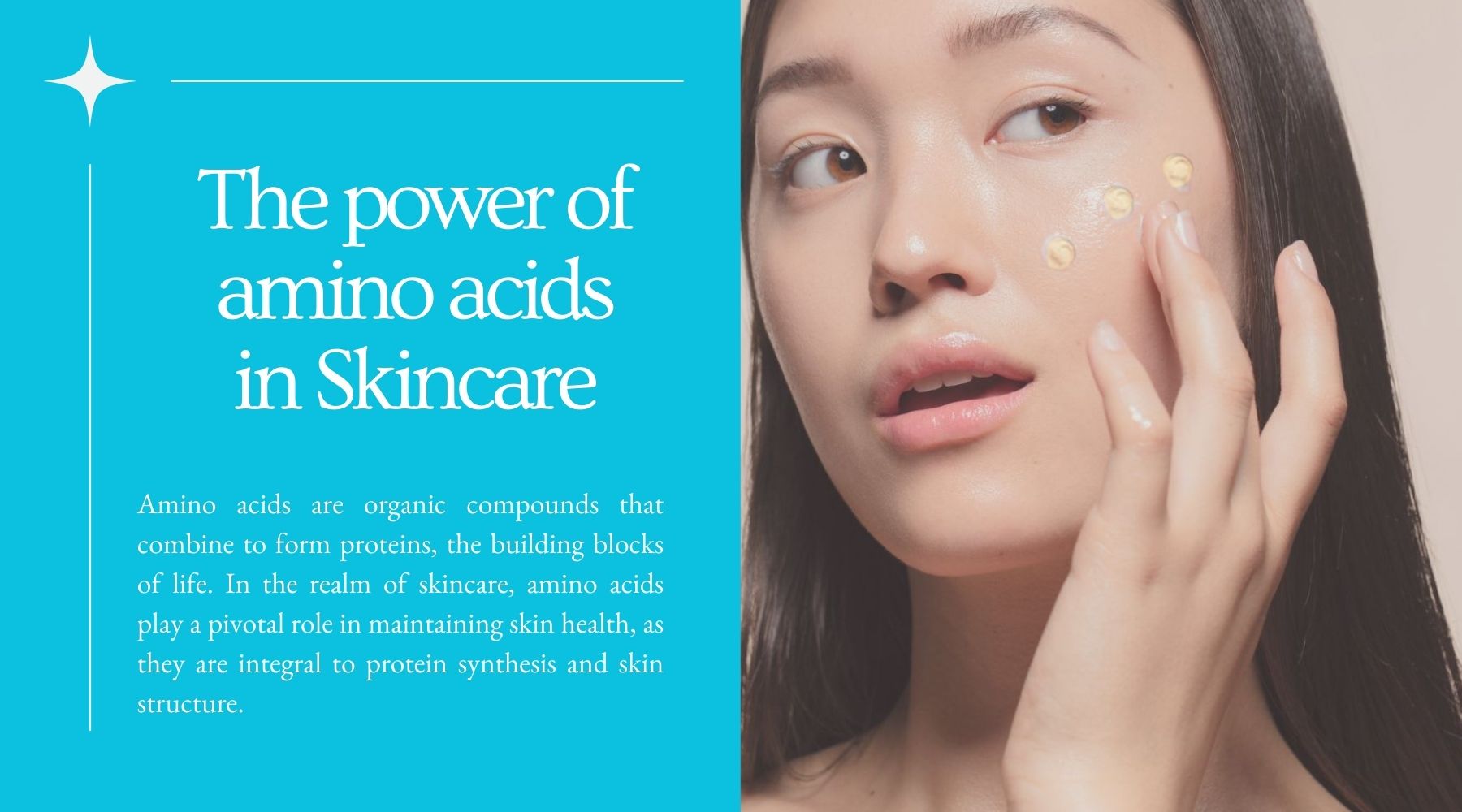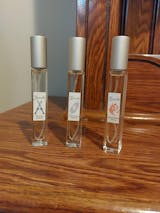Introduction
Amino acids have taken the skincare world. From moisturizers to cleansers, these potent compounds are being hailed as transformative ingredients. But what makes amino acids so special, and why are they trending in the beauty industry? Let's delve into the power of amino acids in skincare.
Why Amino Acids Are Trending in Skincare
Amino acids are the building blocks of proteins, essential for various bodily functions, including skin health. Their ability to promote hydration, support collagen production, and enhance skin repair has captured the attention of scientists, dermatologists and skincare enthusiasts alike. This surge in popularity is backed by scientific research and real-world results, making amino acids a staple in modern skincare routines.
Understanding the Basics: What Are Amino Acids?
Amino acids are organic compounds that combine to form proteins. In the context of skincare, they are vital for maintaining the skin’s structure and function. There are 20 standard amino acids, each playing a unique role in skin health, from hydration to repair.
By incorporating amino acids into skincare products, manufacturers can target specific skin concerns more effectively.
The Role of Amino Acids in Skin Health
What Do Amino Acids Do for the Skin?
Amino acids serve as the foundation for the skin's natural moisturizing factors, helping to maintain hydration and elasticity. They support the skin’s barrier function, protecting against environmental stressors and preventing moisture loss.
Additionally, amino acids play a crucial role in the synthesis of collagen and elastin, which are essential for maintaining skin firmness and elasticity.
Amino acids are an essential part of our skin's natural moisturizing factors (NMF)

The Science Behind Amino Acids and Skin Repair
Amino acids are instrumental in skin repair due to their involvement in cellular regeneration. When the skin is damaged, amino acids aid in the production of new skin cells and the repair of damaged tissues. This makes them particularly effective in healing wounds, reducing scars, and improving overall skin texture.
Benefits of Amino Acids for the Skin
Amino acids are excellent for a wide array of skin concern such as hydration, repair, protection and anti-aging. Let’s dive a little deeper:
Amino Acids for Hydration: How They Work and How Do They Help
Amino acids attract and retain moisture in the skin, acting as humectants. This hydration boost helps to plump the skin, reducing the appearance of fine lines and wrinkles. Additionally, amino acids enhance the skin's natural barrier, preventing water loss and maintaining a dewy, youthful complexion.
Do Amino Acids Tighten Skin? Exploring the Evidence
There is growing evidence that amino acids can tighten and firm the skin. By promoting collagen and elastin production, amino acids help to improve skin elasticity and reduce sagging. Clinical studies have shown that regular use of amino acid-infused products can lead to a noticeable improvement in skin firmness.

Can Amino Acids Make You Look Younger? Anti-Aging Benefits
Amino acids offer significant anti-aging benefits. They support the production of collagen, which decreases with age, leading to wrinkles and loss of skin tone. Amino acids also have antioxidant properties, protecting the skin from free radical damage and slowing down the aging process. Users often report smoother, firmer, and more radiant skin after incorporating amino acids into their routines.
Amino Acids for Skin Barrier Support and Protection
A strong skin barrier is essential for protecting against environmental aggressors like pollution and UV rays. Amino acids fortify the skin barrier, enhancing its resilience and ability to retain moisture. This protective layer helps to prevent dryness, irritation, and breakouts, ensuring healthier, more balanced skin.
Key Amino Acids in Skincare Products
Arginine: The Multi-Tasking Amino Acid
Arginine is a versatile amino acid with multiple skincare benefits. It promotes wound healing, enhances skin hydration, and has antioxidant properties that protect the skin from damage.
Arginine also helps to improve skin elasticity, making it a popular ingredient in anti-aging products.
Lysine: Essential for Healthy, Resilient Skin
Lysine is crucial for collagen production and skin repair. It helps to maintain the skin’s structure and elasticity, preventing sagging and wrinkles. Lysine also has moisturizing properties, keeping the skin hydrated and supple. It is the “Firming Agent” of amino acids and strengthens the skin’s surface.
Histidine: The Skin Barrier Protector
Histidine helps maintain the skin’s barrier function and has antioxidant properties. It protects the skin from environmental damage and stress. It is very soothing and support damaged tissue repair.
Glycine: The Unsung Hero for Skin Smoothness
Glycine is a simple but powerful amino acid that plays a crucial role in collagen production. It helps to smooth the skin’s texture and reduce the appearance of fine lines. Glycine also has anti-inflammatory properties, making it beneficial for calming irritated skin.
Proline: Collagen Booster
Proline and hydroxyproline are essential for the synthesis of collagen. These amino acids help to maintain the skin’s structure and firmness, reducing the signs of aging especially when paired with other amino acids. They are particularly effective in targeted treatments for wrinkles and sagging skin. Studies have demonstrated significant improvements in crow's feet with proline application.
Amino Acids for Healthy Skin

More Amino Acids in Skincare and Their Benefits
Methionine: protects the skin from harmful substances.
Leucine: Acts at the wound healing processes and improves fine lines and wrinkles when paired with other amino acids.
Glutamine: Like glycine, glutamine prevents tissue breakdown and increases rates of healing.
Tyrosine: Helps other ingredients penetrate the skin for maximum effectiveness.
Alanine: Re-energize the skin and promotes the healing process
Threonine: Participates in collagen and elastin formation.
Serine: Natural moisturizing agent. It is present at the skin metabolism process, promoting cell renewal.
Glutamic acid: Stimulates cells regeneration and boosts skin's metabolism.
Aspartic Acid: Helps to absorb minerals into our skin. Minerals are calcium, magnesium, zinc, and potassium.
These amino acids, while useful on their own, often work best in conjunction with each other. For example, a combination of lysine and arginine can effectively treat certain skin infections, while proline and leucine can fight wrinkles best when paired together!
Hydrolyzed rice protein is the perfect source of peptides and power pack of amino acids in skincare. It contains arginine, histidine, lysine, proline, methionine, tryptophan, glutamine, leucine, valine, cysteine, threonine, alanine, glycine, serine, tyrosine, aspartic acid, glutamic acid and more.
How to Incorporate Amino Acids into Your Skincare Routine
Choosing the Right Amino Acid Containing Products
When selecting amino acid-infused products, consider your skin type and specific concerns. Look for products with high concentrations of key amino acids and complementary ingredients like vitamins and peptides. Opt for reputable brands known for their quality formulations.
Morning vs. Night: When to Use Amino Acids
Amino acids can be used both in the morning and at night. In the morning, they provide hydration and protection against environmental stressors. At night, amino acids support the skin’s natural repair processes. Incorporate them into your routine based on your skin’s needs and the specific product instructions.
Mastering a Minimalist Routine

Amino Acids in Different Skincare Products
Moisturizers: Daily Dose of Amino Acids
Moisturizers infused with amino acids provide continuous hydration and nourishment. They help to maintain the skin’s moisture balance and improve texture. Use amino acid-based moisturizers as the final step in your skincare routine to lock in hydration.
Cleansers: Bringing Gentleness And Maintaining Cleansing Effectiveness
Amino acid-based cleansers are gentle on the skin while effectively removing impurities. They help to maintain the skin’s natural pH balance and prevent dryness. These cleansers are suitable for all skin types, including sensitive skin.
Comparing Amino Acids to Other Skincare Ingredients
Amino Acids vs. Peptides: What’s the Difference?
While both amino acids and peptides are essential and beneficial for the skin, they serve different functions.
Amino acids are the building blocks of proteins, while peptides are short chains of amino acids. Basically, large chains of amino acids form proteins while short chains of amino acids form peptides.
Peptides signal the skin to produce more collagen, whereas amino acids provide the necessary components for this process.
Together, they offer a comprehensive approach to skin health. Hydrolyzed rice protein is our favorite source of a wide range of amino acids, peptides and proteins hence why it is a staple in Lancolia's skincare and haircare products.
Combining Amino Acids with Vitamins for Maximum Benefits
Vitamins like B3 and E can enhance the benefits of amino acids. Vitamin B3 boosts collagen production and brightens the skin, while Vitamin E provides antioxidant protection.
Combining these vitamins with amino acids can result in more radiant, youthful-looking skin. These can be found working synergistically with other ingredients in what our clients call the "holy grail moisturizer" essence de jeunesse.

Common Myths About Amino Acids in Skincare
Debunking the “All-Natural” MythNot all amino acids used in skincare are derived from natural sources. While natural amino acids are beneficial, synthetic versions can be more stable and effective. It’s essential to focus on the efficacy of the product rather than the source of its ingredients.
Addressing Concerns About Sensitivity and Irritation
Amino acids are generally well-tolerated, but rare sensitivity can occur in some individuals. Start with lower concentrations and perform a patch test before full application. If irritation occurs, discontinue use and consult a dermatologist.
Expert Tips for Maximizing the Benefits of Amino Acids
Dermatologist-Approved Tips for Using Amino Acids
Dermatologists recommend incorporating amino acids into your skincare routine by starting with a single product and observing your skin's response. Consistency is key, so use amino acid-based products regularly to achieve optimal results.
Amino acids are essential for maintaining skin health, playing a crucial role in various skin functions and treatments. According to Justine Kluk, MD, a dermatologist at Schweiger Dermatology Group in NYC, "Amino acids are the building blocks that make up proteins and have a role in virtually all the biological processes that occur in our bodies. The sequence in which they combine determines which particular protein they will form and how they will function."
Richard Bottiglione, MD, board-certified dermatologist and founder of Dermatologist’s Choice Skincare, explains, "Amino acids are vital components for bodily functions and skin health, supporting natural skin functions and stimulating collagen and elastin production, which are key for plump, youthful skin."
DIY Skincare: Can You Create Amino Acid Treatments at Home?
While DIY amino acid treatments can be tempting, it’s challenging to achieve the same efficacy as professionally formulated products. For best results, invest in well-formulated commercial products.
Transformations with Amino Acid Skincare
Many users have experienced significant improvements in their skin’s texture, hydration, and firmness with amino acid skincare. Testimonials often highlight reduced wrinkles, smoother skin, and a more youthful appearance. These real-life success stories underscore the effectiveness of amino acids.
Conclusion
Recap The Power of Amino Acids in Skincare
Amino acids are a powerful addition to any skincare routine, offering a multitude of benefits from hydration to anti-aging. Their ability to support skin health and enhance the efficacy of other ingredients makes them indispensable in modern skincare.
Next Steps: How to Start Your Amino Acid Skincare Journey
Ready to harness the power of amino acids? Start by choosing quality products that suit your skin type and concerns. Incorporate them into your daily routine, and enjoy the transformative benefits of healthier, more radiant skin.
Frequently asked questions
Question 1: Do amino acids tighten skin?
Yes. Amino acids can contribute to skin tightening by supporting the production of collagen and elastin, two essential proteins that maintain skin elasticity and firmness. Collagen provides structure to the skin, while elastin allows it to return to its original shape after stretching. Specific amino acids, such as glycine, proline, and hydroxyproline, are integral to collagen synthesis. Clinical studies have shown that topical application of amino acid-rich products can lead to improved skin firmness and reduced sagging over time.
Question 2: Can amino acids make you look younger?
Yes. Amino acids can help achieve a more youthful appearance by promoting collagen production, improving skin hydration, and enhancing overall skin repair. Collagen is a key protein that maintains skin structure, reducing the appearance of fine lines and wrinkles. Additionally, amino acids such as serine, threonine, and arginine aid in maintaining moisture balance and repairing damaged skin cells, contributing to a smoother and more radiant complexion. Their antioxidant properties also protect the skin from free radical damage, which can accelerate aging.
Question 3: Are peptides or amino acids better for skin?
Both peptides and amino acids offer significant benefits for the skin, but they function differently. Peptides, which are short chains of amino acids, act as signaling molecules that prompt the skin to produce more collagen and elastin. This can lead to noticeable improvements in skin firmness and texture. Amino acids, on the other hand, are the building blocks of these proteins and are essential for the actual synthesis of collagen and elastin. The choice between peptides and amino acids depends on individual skin needs. For targeted anti-aging effects, peptides might be more effective, while amino acids are crucial for overall skin health and hydration .
Question 4: What are the best amino acids for over 50?
For individuals over 50, the most beneficial amino acids are those that support collagen production, hydration, and skin repair. Key amino acids include:
Arginine: Promotes wound healing, hydration, and has antioxidant properties to protect against aging.
Lysine: Supports collagen stability and skin repair, enhancing overall resilience.
Glycine: Essential for collagen formation, improving skin firmness and texture.
Proline and Hydroxyproline: Crucial for collagen synthesis, helping to maintain skin elasticity.
Serine and Threonine: Help maintain skin moisture and support the skin barrier.
Using products that contain these amino acids can help address the common signs of aging, such as wrinkles, dryness, and loss of elasticity, providing a more youthful and vibrant appearance.
Learn More
Lancolia's Fantastic Four, our proprietary blend featured in our skincare and haircare lines, includes Hydrolyzed Rice Protein, an essential source of amino acids. These amino acids play a crucial role in deeply nourishing and strengthening both skin and hair. Present in many of our Lancolia products, this blend ensures optimal hydration, enhances elasticity, and supports overall health and vitality. By incorporating Hydrolyzed Rice Protein, we provide a foundation of nourishment that leaves your skin radiant and your hair resilient and glossy.
Explore our best-sellers today!
References for this information:
- Annals of Translational Medicine, December 2018, pages 1–10
- Journal of Cosmetic Dermatology, July 2022, pages 3,046-3,052
- Experimental Dermatology, January 2021, pages 38-49
- Journal of Clinical Biochemistry and Nutrition, July 2019, pages 52-58
- International Journal of Toxicology, Nov-Dec 2013, pages 41S-64S
- BRODY, Laurence C. Amino Acids, National Genome Research Institute, 2022
- SOLANO, F. Metabolism and Functions of Amino Acids in the Skin, AEMB, 2020
- ALBAUGH, Vance L et al. Arginine, Reference Module in Life Sciences, 2017
- TAN Sp et al. Feeding filaggrin: effects of L-histidine supplementation in atopic dermatitis, Clin Cosmet Investig Dermatol, 2017
- Methionine, PubChem, 2022
- The Role of Amino Acids in Skin Care, Dermatology Research and Practice
- Amino Acids and Their Anti-Aging Benefits, Clinical Interventions in Aging
- Amino Acids: Antioxidant and Anti-Aging Properties, Journal of Nutritional Biochemistry
- Anti-Aging Benefits of Key Amino Acids for Mature Skin, Aging and Skin Care Journal
- Understanding the Role of Amino Acids and Proteins in Skin Care, Dermatology Times
- Metabolism and Functions of Amino Acids in the Skin, PubMed
- Effect of amino-acid intake on physical conditions and skin state: a randomized, double-blind, placebo-controlled, crossover trial, NCBI


